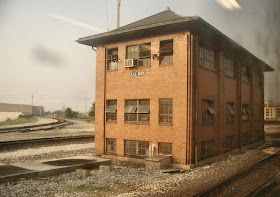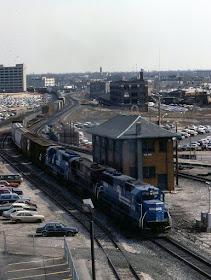The Londonist has just produced a very interesting piece on the LUL Edgware Road signal cabin, which was built in 1926 with a Westinghouse Style K interlocking machine (license built UK version of a US&S Model 14). Unfortunately the London Underground has been bitten by the same CTBC bug as the NYC Subway, despite the old adage "If it ain't broke, don't fix it". The article comes with an attached video and numerous photos of the signal cabin and a number of other cabins also at risk for closure. Because putting one's eggs in one basket is all the rage, the LUL will also be converting to a centralized control center model.
The good news is that there are plans to preserve the cabin, although the ultimate level of interactivity or public access remains unclear. Here is another video showing a compressed view of an entire night shift at the cabin.
A blog devoted to explaining the ins and outs of North American railroad signaling, past, present and future. This blog seeks to preserve through photo documentation the great diversity and technical ingenuity of 20th century signaling and interlocking hardware and technology. Related topics cover interlocking towers and railroad communications infrastructure.
Note, due to a web hosting failure some of the photos and links may be unavailable.
Friday, May 31, 2019
Monday, May 27, 2019
NYCTA Northern Blvd Tower Closed
I have some to realize that every time I see something that appears to be escaping the threat of upgrade, it is actually on tap for complete removal. This was the case with CP-TITUS and more recently it was the case with Northern Boulevard interlocking on the IND Queens Boulevard Line.
Northern Boulevard is on the local loop of the Queens Boulevard line that takes a longer path than the center express tracks. It was one of the smallest tower controlled interlockings left on the NYCTA with a single crossover and 5 signals controlled from a 7 lever GRS Model 5 interlocking machine from 1933. Some say it was intended as a short turn terminal for one of the old IND local services.
When I last visited this site a year or so ago I did not see any of the replacement signals I had spotted at larger interlockings like Union Turnpike and Continental Ave. At first I thought the local loop was going to escape the CBTC re-signaling project, but I just caught word that the simple interlocking had been completely ripped out.
Noted NYCTA Videographer DJ Hammers actually compiled a short video detailing the changes that took place over a week or so.
With the 6th Ave line following the Queens Boulevard Line in being re-signaled, the NYC Subway is getting alarmingly short of electro-mechanical interlocking machines, so get out and try to catch them while you can.
Northern Boulevard is on the local loop of the Queens Boulevard line that takes a longer path than the center express tracks. It was one of the smallest tower controlled interlockings left on the NYCTA with a single crossover and 5 signals controlled from a 7 lever GRS Model 5 interlocking machine from 1933. Some say it was intended as a short turn terminal for one of the old IND local services.
When I last visited this site a year or so ago I did not see any of the replacement signals I had spotted at larger interlockings like Union Turnpike and Continental Ave. At first I thought the local loop was going to escape the CBTC re-signaling project, but I just caught word that the simple interlocking had been completely ripped out.
Noted NYCTA Videographer DJ Hammers actually compiled a short video detailing the changes that took place over a week or so.
With the 6th Ave line following the Queens Boulevard Line in being re-signaled, the NYC Subway is getting alarmingly short of electro-mechanical interlocking machines, so get out and try to catch them while you can.
Monday, May 13, 2019
PRR West Slope Signals Replacement Under Way
I'm not really here to provide a play-by-play of the PRR Main Line re-signaling project being undertaken by NS, but after having stalled for a good number of months it rocketed ahead from CP-HUNT through CP-TUNNEL and CP-GRAY and all the way down the 3-track raceway to CP-ANTIS nailing such iconic photo locations as Tipton and Fostoria.
Because NS decided not to alter the previously re-signaled Altoona terminal area they were then able to proceed up the east slope to CP-MG a couple of weeks ago. I have heard that the plan is to get down to CP-SF by the end of May which would impact CP-AR/UN, CP-MO at Cresson and the famous signals at Lilly and Summerhill. I have a couple of pickups to do on the West Slope so hopefully I can get them before the last Sunday in May, as NS likes to do signal cut-overs on Sunday.
 |
| 1980's vintage PLs taken down from the Fostoria signal bridge. |
Monday, May 6, 2019
Indianapolis IU Tower Faces Demolition
The former Indianapolis Union Railway IU (Indianapolis Union) tower that sits directly to the east of Indianapolis Union Station is being prepped for demolition by CSX. This tower and interlocking was special in many ways. built as part of the Indianapolis Union Station modernization project in the 1930's, the tower contained a ~130-lever US&S Model 14 interlocking machine that controlled a massive field of slow speed double-slip switches and dwarf signals. Unlike the similar passenger terminal in Cincinnati, Indianapolis Union was also a junction for through trains from the PRR, NYC, B&O and Monon railroads.
Unified under the Penn Central and later Conrail, "IU INT" was drastically simplified, but still retained it's dwarf signals and pneumatic switches. While the tower was technically closed around 1990, it became what I calla "zombie tower" in that it still housed the active logic for the interlocking plant, under remote control, in addition to the air plant for the switches. The general layout included the two main tracks of the Indianapolis Line, a central wye junction with the Louisville Secondary and an east end junction with the ex-Monon line to Cincinnati. Two additional station tracks ran out to the north of the tower and entered into a strange 3 track middle segment with a number of parallel turnouts and routes that required most through trains to diverge at slow speed.
While the air plant would be moved out of the tower in the early 2000's, the interlocking remained un-resignaled for nearly 20 years into the CSX era. In 2018 a general re-signaling and rationalization was carried out. Dwarf signals were replaced by Seaboard rule Darth Vadar cantilevers and masts, pneumatic points were replaced by electric and the plant was changed to two through tracks with the wye, station tracks and Cincinatti branch feeding in before a central crossover. The current Google Earth view shows the reconfigured interlocking.
With the building no longer needed and located in the center of a wye junction in a major city it appears that CSX sees no avenue for re-use or preservation. Asbestos and window removal is now underway. It has been reported that historic equipment in the upper floor is being preserved. While I was not expecting the tower to be demolished, I am not surprised by the re-signaling. IU had lasted far longer than it had any right up under a railroad that is outright hostile to just leaving things the way they are.
Unified under the Penn Central and later Conrail, "IU INT" was drastically simplified, but still retained it's dwarf signals and pneumatic switches. While the tower was technically closed around 1990, it became what I calla "zombie tower" in that it still housed the active logic for the interlocking plant, under remote control, in addition to the air plant for the switches. The general layout included the two main tracks of the Indianapolis Line, a central wye junction with the Louisville Secondary and an east end junction with the ex-Monon line to Cincinnati. Two additional station tracks ran out to the north of the tower and entered into a strange 3 track middle segment with a number of parallel turnouts and routes that required most through trains to diverge at slow speed.
While the air plant would be moved out of the tower in the early 2000's, the interlocking remained un-resignaled for nearly 20 years into the CSX era. In 2018 a general re-signaling and rationalization was carried out. Dwarf signals were replaced by Seaboard rule Darth Vadar cantilevers and masts, pneumatic points were replaced by electric and the plant was changed to two through tracks with the wye, station tracks and Cincinatti branch feeding in before a central crossover. The current Google Earth view shows the reconfigured interlocking.
With the building no longer needed and located in the center of a wye junction in a major city it appears that CSX sees no avenue for re-use or preservation. Asbestos and window removal is now underway. It has been reported that historic equipment in the upper floor is being preserved. While I was not expecting the tower to be demolished, I am not surprised by the re-signaling. IU had lasted far longer than it had any right up under a railroad that is outright hostile to just leaving things the way they are.






